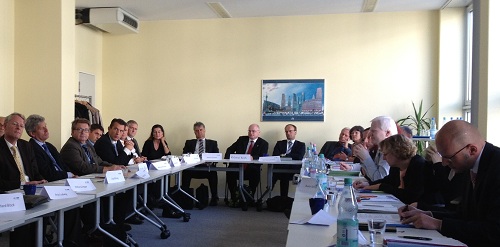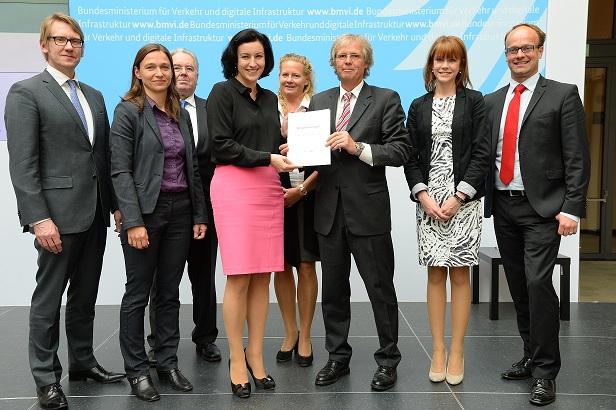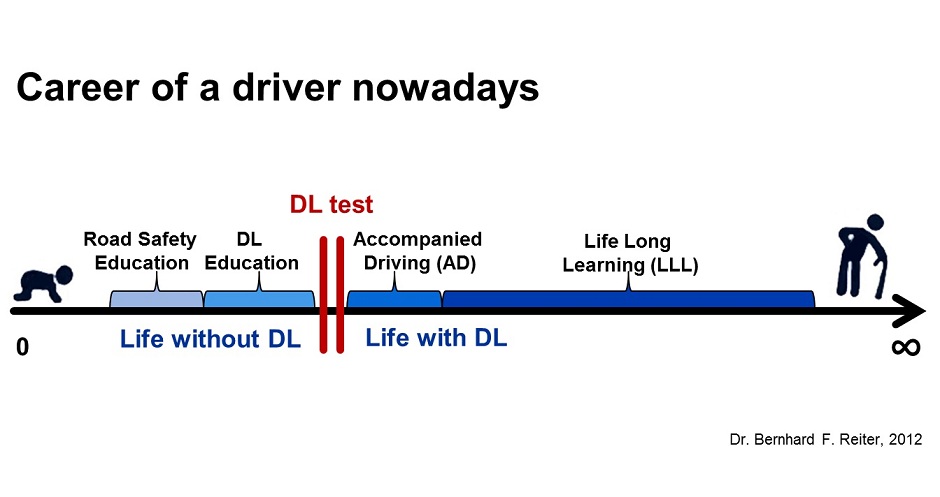MOVING – as the name suggests – wants to set things in motion. For this reason we are active in various traffic safety topics. If you would like to learn more about our activities, please find your way to the corespondig section in the page below.
- Ad-hoc working group – professional drivers
- Lifelong Learning
- Arge AB 21
- DG MOVE
- Road safety education
Ad-hoc working group – professional drivers
In close cooperation with the German Federal Ministry of Transport, Building and Urban Development MOVING organised a series of meetings about German professional drivers (BKF) legislation. Representatives from professional organisations have the possibility to meet with representatives from the federal and regional ministries and authorities as well as representatives from the regional chambers of commerce to discuss challenges and latest developments. About 40 experts participated in the first meeting that took place in September 2012 in Berlin.

Participants of the 1st meeting September 2012 (TÜV NORD Akademie, Berlin)

Übergabe der Empfehlungen der ad hoc-AG BKF an Dorothee Bär, Parl. Staatssekretärin im Bundesministerium für Verkehr und digitale Infrastruktur
v.l. Frank Huster (DSLV), Antje Janßen (MOVING), Gerhard von Bressensdorf (BVF), Dorothee Bär (BMVI), Heike Lüben (ADAC), Jörg-Michael Satz (MOVING), Martina Ruprecht (BDFU), Ralf Vennefrohne (Springer Fachmedien München GmbH)
In 2014 the recommendations have been handed over to the Ministry of Transport.
1st meeting in Berlin (September 2012)
2nd meeting in Cologne (January 2013) – In addition to German participants representatives from Austria and Spain were invited to give a short report about their experiences in the field of professional drivers.
3rd meeting in Munich (June 2013)
4th meeting in Berlin (November 2013)
5th meeting in Berlin (April 2015)
6th meeting in Munich (September 2016)
7th meeting in Berlin (2018)
Lifelong Learning
Those who obtain their driving licence category A or B today in Germany keep it for lifetime, eventhough they have to renew the document every 15 years from the 19th January 2013 onwards. But is the driving licence for life at all up-to-date? Would road safety possibly increase if each owner of a driving licence would have to go for a check-up at the doctor, refresh his/her first-aid course or his/her theoretical driving skill every 10 years?
At least it can be noted that Europe is dealing with the concept of lifelong learning – and does so for already a long time. This can be read as an example given by the European Commission:
Making a European Area of Lifelong Learning a Reality
“…all learning activity undertaken throughout life, with the aim of improving knowledge, skills and competences within a personal, civic, social and/or employment-related perspective.” [ EU COM/2001/678 ]

Arge AB 21
looking ahead:
In the “Rahmenkonzept zur Weiterentwicklung der Fahranfängervorbereitung in Deutschland”, the final report of a BASt expert group on preparation of novice drivers (Fahranfängervorbereitung) dating from July 2012, in chapter 3.6, it states as follows:
BASt-Rahmenkonzept FAV – Auszug Schlussfassung (extract in German), 13th July 2012
Arge AB 21
The focus of such an institution will be to promote education and accident prevention in the areas of road safety and traffic education, along with the associated professional driving training, the driving instructor training as well as the driving licence exam in Germany and worldwide. Since 1999 there exists a permanent working group on driving testing, the TÜV | DEKRA arge tp 21 located in Dresden.
DG MOVE
DG MOVE (Directorate-General for Transport and Mobility) develops and oversees the European Union’s actions in the field of transport and mobility.
The aim is to promote economic, labor supply and investment growth.
In addition, the policy areas of the single economic space, migration, as well as energy and climate protection are affected by the decisions of DG MOVE.
On May 17, the European Commission presented its efforts on the third mobility package. Under the title “Europe on the move”, the project closes the circle of the European agenda for the modernization of transport. The Commission plans a smooth transition to safe, clean and automated transport:
Europe on the Move: Commission completes its agenda for safe, clean and connected mobility
Faktsheets by DG MOVE:
- Shaping the Future of Mobility
- Safe Mobility – A Europe that protects
- Clean Mobility – Implementing the Paris Agreement
- Connected & Automated Mobility – For a competitive Europe
- The Trans-European Transport Network (TEN-T)
- European Maritime Single Window environment & e-freight transport information
Road safety education
Road safety education and mobility training should be attractive to those road users, who are particularly vulnerable. In nurseries and schools therefore great emphasis is placed on teaching of traffic rules and proper behavior in traffic. Training depends not only on learning material appropriate to the age of the children, but also on teaching concepts. MOVING and its members facilitate road safety education and support activities in daycare centers and schools.
Road safety education in Germany today
The term road safety education refers to teaching actions to children and young people primarily, to help and assist them in developing their behaviour on roads. Thus, road safety education goes far beyond the pure teaching of traffic rules, and includes the areas of social education, immigration, inclusion, diet, mobility as well as environmental, safety and health education.

On 10 May 2012, the Ministers of the German federal states have adopted a new “KMK recommendation on mobility and road safety education in schools”. This new policy paper included further more socially relevant issues such as climate change, transport area design, future viability or sustainability. Background and objective is to realize road safety education not only at school but as a task of the whole society where different partners are playing an increasingly important role. In addition to police, associations, road patrols (Verkehrswachten) and other external partners and institutions also publishers have an increasingly important part. They develop educationally valuable and practical materials and media for the target groups to effectively support all actively involved in road safety education. With the help of road safety education young people at an early stage can learn and practice sustainable mobility that helps them to cope with future challenges safely and confidently.
Road safety education in Germany is located at various levels of society, however, it is also characterized by interdisciplinary cooperation and diversity. Due to the federal structure in Germany, the federal states are independently responsible for road safety education in school. Therefore, in Germany each state has developed its own curricula and guidelines for road safety education in schools with (sometimes) different priorities.
Traffic education begins in kindergarten. However, there it is not a top priority, because educators are rarely involved in this topic during their training. But small children even at an early stage take part in road traffic, passively or actively. Wrong decisions and misbehaviour may cause injury or even death. Not only for this reason, road safety education is one of the essential tasks of everyone’s education. Only those who recognize hazards early and who learned deal with them properly, gain autonomy and competence.









